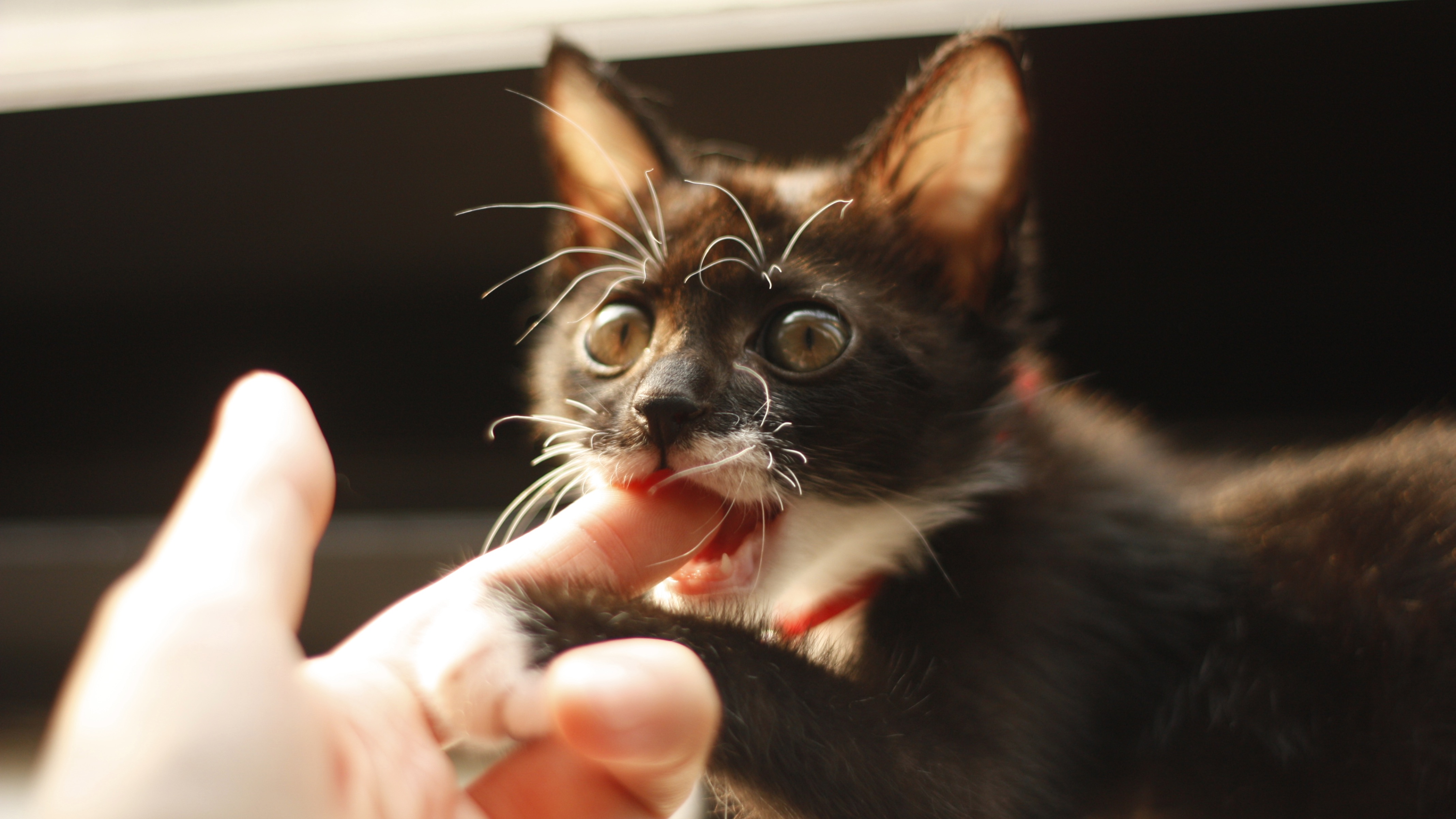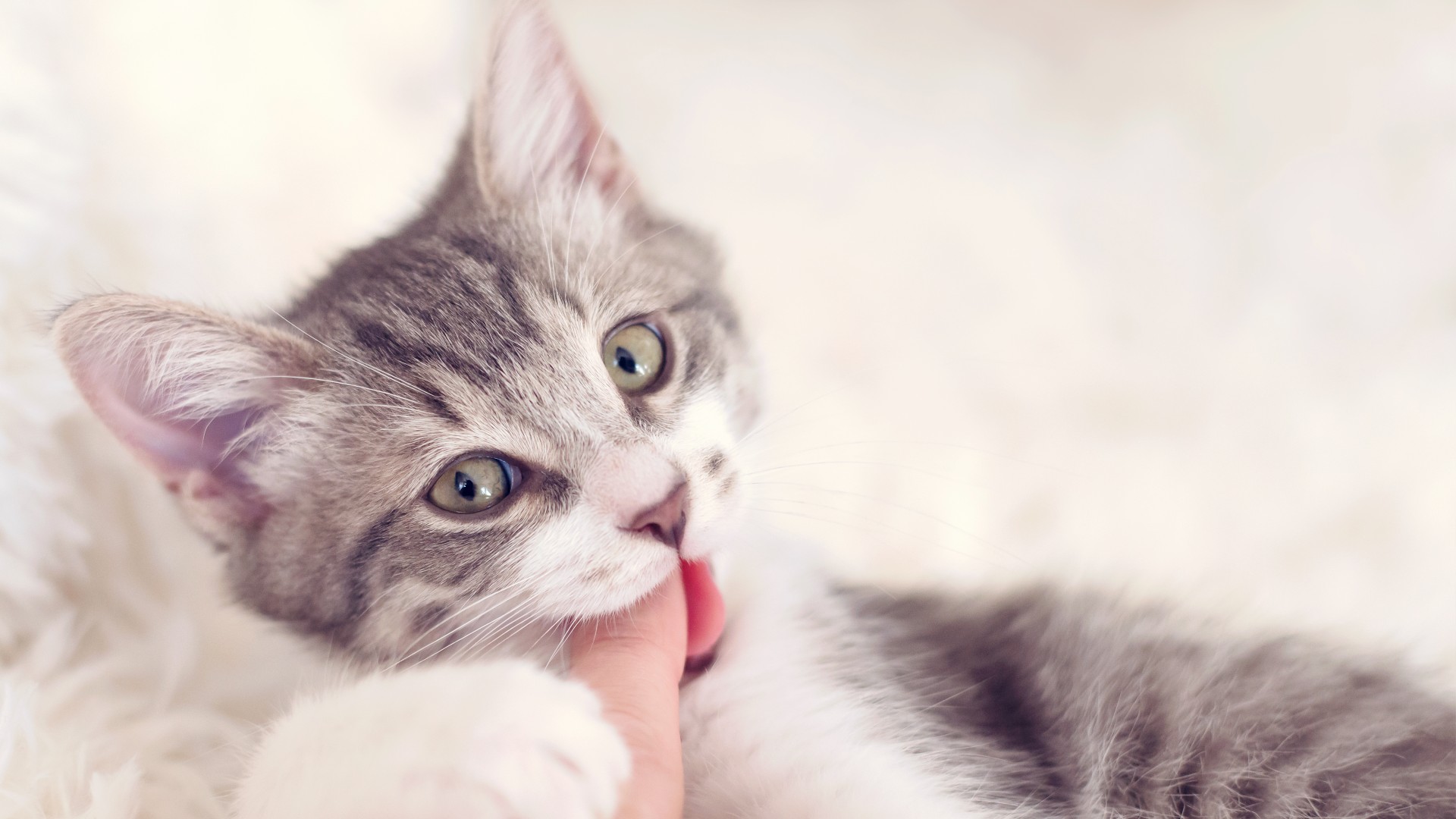Is your sweet kitten biting you? Here's how to teach them to play nice
Want to put a stop to your kitten biting you? These tips from an expert vet have got you covered

When you were first thinking of adding a little feline to your family, your new kitten biting you probably never crossed your mind. After all, most of us associate getting a kitten with lots of playtime and cuddles, so having your limbs used as their favorite chew toy may have come as quite a shock!
If you spent ages researching the best kitten food, selecting a cozy and comfortable bed, and getting their litter box all set up, you may be wondering what you’ve done to deserve being bitten. But rest assured, your kitten isn’t deliberately trying to harm you.
Biting is a very normal behavior for kittens and while it can be related to aggression, most often biting is the way your beloved bundle of fluff explores the big and exciting world they’ve just found themselves in. It can also be a way to get your attention and can also happen during teething, but the good news is, this behavior can be overcome.
When it comes to things to consider when you get a kitten, ensuring you have time to engage in consistent training with your fur friend is going to be key — especially when it comes to stopping biting behaviors. For advice on the best way to phase out biting, we spoke to expert vet Dr. Hannah Godfrey. Here’s what she had to say…
Why is your kitten biting you?
When newborn kittens are with their littermates, biting each other while they’re playing and cuddling is very normal behavior. Once you’ve welcomed the newest addition to your family into your home, there are several reasons why they may continue to bite, even though they are no longer with their brothers and sisters.
1. They’re exploring their world
Just like puppies, kittens explore their world using their mouths. This is how they interact with their surroundings and learn about their new environment. Biting is also part of the instinctive hunting skills that all kittens have inside of them and so it’s normal for them to bite while chasing, pouncing, play-hunting and play-fighting.
Get the best advice, tips and top tech for your beloved Pets
2. Play aggression
Rough play is basically your kitten practicing for when they’re an adult when they may need to use their chase and catch prey drive. Dr. Nicholas Dodman, professor and clinical behaviorist at Tufts University College of Veterinary Medicine, explains:
“Kittens are adorable, but when they are around four months of age, a dark side usually emerges – a side that involves seemingly diabolical aggression,” Dodman says. “As troubling as the attacks can be, play aggression is a normal part of kittens’ development.”
Dodman says that your kitten biting you has nothing to do with wanting to hurt you. Instead, they’re simply trying to gain those valuable hunting skills that they’d be reliant on if they were in the wild.
3. They want attention
Your kitten may give you a little nip, known as a ‘love bite’ in order to demand your attention. Kitten’s actually see it as a fun game when they playfully bite you and get a reaction, so being mindful of that is key.
"When your kitten bites you, you probably say ‘Ow’ or shout out in shock (it’s not easy not to!). Even though your reaction isn’t particularly pleasant, you’re still giving your kitten your undivided attention in that moment, which might be all your kitten wants," explains Godfrey.
4. Teething time
Between the ages of three to six months, you’re going to want to have a supply of the best kitten teething toys on hand as those baby gnashers start to fall out and give way to adult chompers. During these few kitten teething months, you may notice an increase in biting behavior as your kitten seeks to soothe their sore gums - teething toys can help you redirect this behavior onto a more appropriate object.
"Kittens often get a bit bitey around teething time, and I’ve had owners come to me concerned that this means they have a nasty cat. I always reassure them that biting at this age is normal and as long as it’s redirected and not encouraged it’s usually a phase," explains Godfrey.
5. They’re communicating a boundary
Sometimes, your kitten biting you will be their way of letting you know that they don’t want to be handled or they’ve had enough petting for the time being. Always respect your kitten’s limits and don’t try to force them to interact with you if they don’t want to.
How to get your kitten to stop biting

While you may not have a lot of control over the reasons your kitten is biting, where you can take charge is in teaching them that this behavior isn’t acceptable. There are five essential kitten training tips when it comes to doing this, let’s take a look at each one in detail:
1. Redirect their attention towards toys
Part of the reason your kitten loves biting you so much is because they absolutely adore playing and for the most part, biting really is just one big game to them. In order to teach polite play habits, what you’re going to need to do is to redirect their attention towards a more appropriate object.
The best kitten toys are your best friend when it comes to doing this and we recommend you invest in several different types to keep your kitten interested and entertained. Try wand toys that you can move about, soft toys that they can paw at, and interactive toys, such as lasers and circuit tracks with balls, to see which sort of playthings appeal to your kitten the most.
"Be aware, though, that toys like lasers that encourage pouncing on something they’ll never be able to catch can lead to frustration and worsen their behavior. That’s why, when using a wand toy, it’s important to allow them the satisfaction of succeeding sometimes!," Godfrey advises.
2. Use your voice
An easy and effective way to put a stop to biting is to use your voice to teach your kitten that you don’t like being bitten. There are two methods you can use to do this, the first of these is the hissing method. This is super effective for younger kittens because a hiss mimics the sound their mother would make when she was displeased - simply make a sharp hissing sound whenever your kitten bites you.
The second method is the ‘ouch’ method. When your kitten bites you, let out a loud ‘ouch’ right away. This will cause your kitten to freeze and when you have their attention, you can gently pull your hand away. This is best used on kittens aged six months or over - younger kittens tend to respond better to the hiss method.
"Don’t forget, though, that your playful fluff ball might be biting to get your attention, and in some cases any reaction from you will act as encouragement and reinforce the behavior," says Godfrey.
3. Stop play
Your kitten needs to learn that if they bite, there’s a negative consequence and in this case, that means that playtime or petting time needs to come to an end. When you stop any form of positive attention, your kitten learns that biting equals not being able to get what they want and so they’ll soon quit doing this if there’s no reward in it for them.
Every time your kitten bites you, immediately stop playing with them or petting with them. Only resume what you’re doing when your kitten is calm and you have their attention. Continue to repeat the stop method until your kitten learns that if they want to bond with you, they need to play nice.
"Ignoring your kitten and stopping play as soon as your kitten starts to bite is a great way to help them get the message that biting is a no-go," confirms Godfrey. "Your kitten will want to spend time lots of time playing and interacting with you, and they’ll soon learn that this behavior means they’ll miss out."
4. Praise your kitten
Positive reinforcement is always going to be so much more effective than negative reinforcement, so every time your kitten mouths you without using their teeth or plays with you without biting or lets you pet them without playfully trying to attack you, make sure you give them lots of verbal praise. The best kitten treats can also be a great weapon to have in your arsenal - you’ll be amazed at how quickly our pets can master things when there’s food involved!
"Alongside this, you can completely ignore the negative behavior, and even stop play and ignore them altogether," Godfrey advises. "This gives them a direct comparison between the reward and interaction they gain from not biting."
5. Be consistent
Learning how to train and socialize a kitten takes patience and perseverance, but you will see great results as long as you’re consistent. Make sure that you hold firm and continue to reinforce the behavior you do want to see, while ignoring the behavior you don’t. If there are other adults in the home, make sure that everyone is on the same page when it comes to training so that your kitten knows that all their humans are singing from the same song sheet.
"It’s so hard to be consistent and not give big negative reactions if your kitten is biting and it hurts, but stick at it, and if you’re concerned things aren’t improving your vet will be able to give advice or even refer you to a behaviorist, if necessary," advises Godfrey.
Alongside biting, you may also notice several other normal but undesirable behaviors in your little feline friend. For more on what these are and how to address them, take a look at our guide to the most common kitten behavior problems. If you’re wondering why your cat licks their lips, a vet reveals seven reasons in this feature.

Kathryn is a freelance writer who has been a member of the PetsRadar family since it launched in 2020. Highly experienced in her field, she's driven by a desire to provide pet parents with accurate, timely, and informative content that enables them to provide their fur friends with everything they need to thrive.
Kathryn works closely with vets and trainers to ensure all articles offer the most up-to-date information across a range of pet-related fields, from insights into health and behavior issues to tips on products and training.
When she’s not busy crafting the perfect sentence for her features, buying guides and news pieces, she can be found hanging out with her family (which includes one super sassy cat and a kitten), drinking copious amounts of Jasmine tea and reading all the books.
She has written for a range of publications, including Fit&Well, Top Ten Reviews, LiveScience, Goodto, and Product Hunt.
